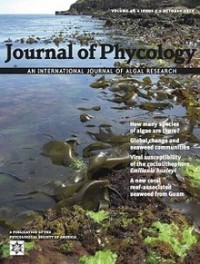Journal of Phycology Q1 Unclaimed
Journal of Phycology is a journal indexed in SJR in Plant Science and Aquatic Science with an H index of 148. Journal with a Single blind Peer Review review system, and It has a price of 2500 €. It has an SJR impact factor of 0,872 and it has a best quartile of Q1. It is published in English. It has an SJR impact factor of 0,872.
Journal of Phycology focuses its scope in these topics and keywords: algae, dinoflagellate, dinophyceae, genus, growth, helminthocladia, limitation, marine, phylogeny, ribosomal, ...
Type: Journal
Type of Copyright:
Languages: English
Open Access Policy: Open Choice
Type of publications:
Publication frecuency: -


2500 €
Inmediate OANPD
Embargoed OA0 €
Non OAMetrics
0,872
SJR Impact factor148
H Index126
Total Docs (Last Year)307
Total Docs (3 years)8589
Total Refs987
Total Cites (3 years)283
Citable Docs (3 years)3.04
Cites/Doc (2 years)68.17
Ref/DocOther journals with similar parameters
Annual Review of Plant Biology Q1
Fungal Diversity Q1
Molecular Plant Q1
Nature Plants Q1
Annual Review of Phytopathology Q1
Compare this journals
Aims and Scope
Best articles by citations
ISOLATION AND CHARACTERIZATION OF A CELL WALL-DEFECTIVE MUTANT OF CHLAMYDOMONAS MONOICA (CHLOROPHYTA)1
View moreLIFE HISTORY OF COLPOMENIA SINUOSA (SYCTOSIPHONACEAE, PHAEOPHYCEAE) IN THE AZORES1
View more121 Influence of Benthic vs. Pelagic Seeding on Coastal Diatom Bloom Development
View moreRECRUITMENT AND PELAGIC GROWTH OF GLOEOTRICHIA ECHINULATA (CYANOPHYCEAE) IN LAKE ERKEN1
View more123 Permanent Fluorescent Nuclear Staining of Binucleate Dinoflagellates
View more36 Nutrients and harmful algal blooms: general issues and examples from the northern gulf of mexico
View more25 Proposal of a new red algal genus in the ceramieae (ceramiaceae, ceramiales)
View more76 The Pneumocystis sam:smt, an atypical fungal enzyme protein
View more124 Evidence for Lateral Transfer of a IE Intron between Fungal and Red Algal Small Subunit Ribosomal RNA Genes
View more161 The Recent Spread of an Invasive Kelp, Undaria Pinnatifida, in California: How Similar is This Invasion to Other Undaria Invasions Worldwide?
View more125 Changing Environmental Conditions and Changes in the Abundances of Rocky Intertidal Seaweeds on Southern California Shores
View more162 Interactions Between Planktonic Microalgae and Protozoan Grazers
View morePROTOTHECA: AN ALGA OR A FUNGUS?
View moreMARINE CRYPTOMONAD STARCH FROM AUTOLYSIS OF GLYCEROL-GROWN CHROOMONAS SALINA1
View more50 Can the effects of ocean warming on temperate reef communities be accurately predicted? lessons from a large scale, long term field experiment in central California
View moreTAKAYAMA GEN. NOV. (GYMNODINIALES, DINOPHYCEAE), A NEW GENUS OF UNARMORED DINOFLAGELLATES WITH SIGMOID APICAL GROOVES, INCLUDING THE DESCRIPTION OF TWO NEW SPECIES1
View more165 The Chloroplast Genome of the Toxic Stramenopile Heterosigma Akashiwo (Raphidophyceae)
View more127 Climate Variability and Phytoplankton Production in PNW Coast Estuaries
View more128 Capturing the Light Fantastic: Oceanographic and Tidal Influences on Intertidal Algae
View moreDO PLASTID-RELATED CHARACTERS SUPPORT THE CHROMALVEOLATE HYPOTHESIS?1
View more169 Cyanobacteria, Taxonomy and Aquatic Odour: Within- and Among-Species Differences Re-Examined
View more"37 Production, survival and morphology of kelp (protista) ""sporophytes"" arising from selfings, apogamy and hybridizations"
View more38 The sysytematics of ochromonas (chrysophyceae)
View more63 Environmental change, interspecific interactions, and shifting algal distributions on rocky shores
View more
Comments